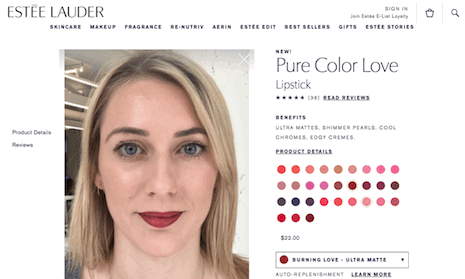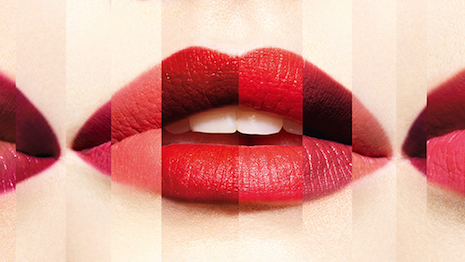Beauty marketer Estée Lauder is helping consumers visualize its cosmetics on their own faces through a personalized try-on experience.
Buying beauty online without a trial can be a challenging prospect, as consumers are unsure how a particular shade will appear on their unique skin tone. Estée Lauder is looking to solve this problem and drive more confident purchases by incorporating ModiFace’s automatic facial analysis technology into its ecommerce platform, allowing shoppers to view makeup on their faces in real-time.
"Instead of going to a store, spending 10 minutes to try 10 lip shades, and then choosing one that might be best for them, consumers can now go online, try 100 lipsticks in 1 minute, share the top five with their friends and choose the one or two that are definitely their best shade," said Parham Aarabi, CEO of ModiFace, Toronto.
"It is much more efficient, more social and has far less friction," he said. "And ultimately, it leads to happier customers and increased sales for brands."
Bringing the counter online
When select products on Estée Lauder’s ecommerce site, consumers can now see how a particular cosmetic will appear on their face when applied.
After pressing a “try it on” button, the consumer is given the option to “go live” or upload a photo. The former connects to the device’s Web cam with permission, bringing in a live feed of the user.
While on camera, as if looking in a mirror, the product immediately appears on the user’s face. The cosmetic becomes part of the consumer’s face, moving with them in the AR experience.
From here, the consumer can try on different colors, testing out lip color and eyeshadow shades to find their best matches.

Example of Estée Lauder's use of ModiFace AR
While using their Web cam, consumers can capture and share their makeover. The site will use the device to take a photo, allowing the user to share it to Twitter, Facebook or Pinterest or download it for reference.
If consumers do not want to use their camera, they still have the option of putting makeup on a model or a photo of themselves.
"We have seen, in general, that conversions increase by 84 percent when AR is added directly in the path to purchase, for example on the product pages," ModiFace's Mr. Aarabi said. "We have also seen that user studies conducted by some of our partners show significant consumer satisfaction with AR.
"As an example, one of our partners has 10k positive user ratings for their app most mentioning the AR functionality," he said.
Augmented selling
LVMH-owned travel retailer DFS has teamed with beauty marketer Estée Lauder to transform fans into influencers with an omnichannel initiative.
The #BeautyAllNight campaign May 1-31 brings together in-store activations with digital touchpoints via Chinese messaging platform WeChat. In a digital beauty first, according to the brands, #BeautyAllNight uses WeChat’s facial recognition technology to apply a “staying in” or “going out” Estée Lauder beauty look on user’s faces.
Once a look is selected, she can pick Estée Lauder products to virtually try on. Consumers can choose from the DFS-exclusive Love of Night set or Pure Color Love lipsticks (see story).
Along with Estée Lauder, other beauty marketers have looked to AR to ease the online shopping experience.
For instance, LVMH's beauty retailer Sephora is now enabling customers to craft their own eyeshadow looks and try experts' curated stylings with purchasable products without having to step foot in a store.
Virtual Artist is Sephora's mobile and online tool that allows users to try on makeup through augmented reality technology. The application has now been updated to include eyeshadow capabilities in which users can try their own blend of products, test expert looks and follow tutorials (see story).
"AR has changed beauty in a very significant way," ModiFace's Mr. Aarabi said. "Seventy-five out of the top 100 beauty brands are now using AR globally to change how products are marketed to and tried on by consumers.
"In fact, AR is one of the key points of focus for most beauty brands, including brands such as Sephora and Estée Lauder."
{"ct":"RiOccOBxsxOJK+JhV+u+X4v3l5FZVKEN85MuChr6pN7ARoXvCQvnAq1EehQTRI0t+n8aUae7w09MqqilKksRSoOJt6XH95M3Q0s4qErhmWo6OoWn4sTyKlluEKLQJSKHfi9JWMz+fsRwoBjlyPAl1+00b2OdxDRn76Juyy5CLdtQeuFlJzJnOWH6DjsDbH7LOrfWuG62Mj\/Ys27w8j5pR9TjmF9NxT8gIH6gz+5zGnfboYr6N7CnxOTXUhMdsJ5qVaoPzAPNBEOVN+SoZ1yFrj3xQfed5sXjvp+GKtAi0HKsgwnEmwgKWpv6qrxW3BqLnd4nZMPWk8sDQblP+VZaX7dePWWBVEJffT4xZm2jkGcbCXYGI3Cs1xbbpF4wprihCpTfM6gH+CjWZ3NbvjMdSJCR8wBMqeDH2rkEFqdTsisfN11oPye0RTPqrgIceYv\/oHO4D76uGl5SBkCs4PQ4y260l\/UOIluKh5s3+kmMpUIs32EmTazRpvJJ6C35ed2Lw9EcNpCganai\/TlYBNtqxXG8g81IC90Fao0rmfB4YFK+HgMfzw6ZbMzuDXwdc7M\/Ko3ttd2TBY0I6eQbTwSlZbalcz7GuwozCKiQtR1ajoSo2ky24eON21ZpAqAT8\/Lr2tBpkSu3AoGDI4DqIXR2li5y1Cc8BHRmb7044Gb4rQCqH2ClRigpDstB93t6oXkuwSCbjJGqYsoaJ7jHWfCFtzk2MqS2T8ajIWp9uycAnLNSjc3AtA6bjzAjdOMt6acVeAssRwcIOjjMqA88oB8dho+R9g1gg69Yog8QEQKhfFTYgyLiDLSHbm71Uws7Ocp3vXHYDVkDFqPmW0omuKqkmjAfS8eAmaKzpGtrATObFBgbosinF8c6JP0D6\/zkS+HyGl6Dsqqz2AGm521IkiQYYR7zarwZVu72cw\/Ml2KA7Rj4kXCY9GPHOaxirBlpVbipLWGOYOZdS3jW5gBJlVWr58TtrcIWzOSQPifiEFirmfXoqx0RSVXdFAWANNafUhIg55lU53M0LBI8GPXc7hN+R\/NYNFJhULkUCeJTgQIRlPuAIwQv8vd33Lvc6Ll7UXcxzDdx37PQSDI+OEVX9CqpINjs\/DSWoLlKCKafwCjFLl9jc7w4z2Dl+QQ+3Ypa8EjE8B15vnc\/\/Z6i3zV8XH2CgLIPhE3p\/Gjz\/oDwWamT\/Zlz48edsolTe8q3xwnhxbulHlF\/KZNN63SjiMYd1K5VUwV2SqOhdNzHfkfSgSDOZSWWAjiga93U+JPWoiCG1SPjhUAUn71Ec\/nYdFR28dFZ\/YwW+DBF3JC3RzTaPSWFMm9sHg8twT4KLmaDVUlWrwf4ffJGNXcaIlpaWBDwndT8oK40OwI4jJjospMkFQm883PZlkU\/b5eTmDFdsf3xp9I2q3ONvIxKJnxUFAkCvKNdBmZ5BRVvW++pWaVNRy8LR8WcxeAUETrlrfgeeBiUU0R\/OyLhu\/do2sUi4gBwCeQH3JprzkDplVZfhd76Bh7ateK5JTQyPQ95z491HSht3jpqcvAMGXsXXQGK\/xIt4rPBAucPNsi4Q0F59qC09CpGOhJbChm9ivMxMhldB4Cwx9oQzHR0Pw0bJke0whqXOWQtqVncRdz3HnkQMhAD1jg2+Dafml+vKLR3GALHlRXTOWKTXhUryGaogITY6dy1iCgf3knZyPQv+ejYqbiDuISNPjf6zZTsEIfdGYJls8q+Z9BeSRBhf4EHOJAxHpI+FeOnjsTJc9POca3cA+Rnboha9ucCAQWvl9\/kfe+AKEtEUIyxs6nHTmnZnyrNMOIDL2f0qALZ7jzSxhGTj18VGWYp9lDXxGJ7Hf5yr4zNoMHa+FNyiKYh79kmcZi3IzmDKVJvQxgmudNiTStqQfD57mePzyGBtSiCdMi3OUtGuH+mN+4tidTV4LQmTkwZgS\/HXseeMBjhJxGgTs9dxnnZeCjOQTsw2+t3ALq9AkvogvAm8pJqC+DlZs6lfWckne0pvhlgZoCJS\/ewzW0MwY\/3L8cjcERj5p9L2YruJJUy4sSsmIT2Sn+FU9x7uaan5V4uxV1NWk0StJf2RI9sh04DK+npe9gey6Y6VnQkbXKE6T+HDNFErCFjl9w7EAsFV906ZnaFoAnfwIzLFUUrN2ytvtnGDzAO9hPKPl6l2TLObPP1\/9mjbykmX8VA6zVCUF+Mz6\/cq\/7SAcV\/mpKnvxbJhS+jVujUQmOPvuoslNQu73TPCdU46TM6SMPCsKAE6nCg0BcLZRy3+dfybN\/D\/UJFajokho97C1k97F0jQSHm6W+FvZ0wTjERn5KqBQNCmbfW6ftS8jHcfzwXo1rMajWNYyphAc06O+pbxbAJHeucu19aLb1dt7Chw+GHjw26xHB79xS2bm7xvThWqB+5i4kyJfWcIJ\/CtpbkA\/e07hLZM2aJvfDGfoG0o7wbVF9xxfLt9XRN21FU\/5a767aOxzBtML7pdkvkz3zt\/Ld9cZeburB0TbrVwFj23yF7mvRegXgBitkyDEMUes51JOQn4VbaR9yCE1XcOnm3yBZR9keJnpkxDa7wS3iKHGuyrmVj0SfAk26QSWHuEUqv1O5vwYM\/jFc63WY74axvU\/G\/CqkDaQCDZSqs01lD9LIqczlgIw3tV7rxlYA8v4iqK3GpTuGsvzYe+\/K+Ve8If8ohavOYYM9BhuOqdinZ82ufjnaM+5NdI1F42DVk8Lz+y549pLILnjc66sOb3TBimR13p8l3Y8bSKgdzykVFAnSbbrne3+9z4hEw4Zz9VK7dsU46QxQv8e1UZVamQN1ZByD2\/a\/7bFEc933+9x1\/FCBn34cOv0LuK\/OJwTZfZVWK5ySSRscRTg5tcZkOAQnoKCugYqmvg7JBzYYOTaqcT3RxvfpcBtPTTIdTDu5BQWXYidiUbfnV6geqmEjf9ipV8007mjnj61sJcWUFNiyZ+cneuEBCCERCa4V15iEIiFjCua4tA+z2CQeYCtrmOKeed9hxtgQLv4P+cUV47txWBL0CahyVObIi6JkXJxtIfTwaqEQe8rmLdElieyuMkMtViG+NXbbLaJsBVLu5G2LYnwW5O8nkWoqZzsd7klehYS1On6\/kLMxtsLd85VP\/DHyLy52X63jvyXyby7awxCahy88Sv3ZPzD+3vHdzV3urqj4ReiWOmMDS0aiNlmGGsFeRyMvIFkagUQaBS4\/BlxXHHjbaxZBosDjxze4AGEmcDrd+FLGLfr37wWB265T5cmjE+ki88FXTojK\/4X9KjJ92rSv1ownXD4aO71FDwYSug+dSRYLrh\/Pf1q0h7KG+2wPC+\/YiEpgzvwFd0xykqt76ucJAOGQdY59ZWbXFmpal5AVcUINm1luLb3cZZqSl0jqOTNwtwplcAuQG4j7OZi+633bJZqCBqwUOXBTQUI0YteHK46QdSZk7TZFUbdNOMyJcZOqTn2mFtEBFw2rn+8HWtVAPIWZHoZ8C\/fRkMR4brMB1wCWnszQcFf\/wvbAiVqwr3wgw249W6FqOHIIANzVszW8H\/3lyfRCUQqumxYH9X7x99JoAGltCuBMTPYoXOF7BsI+3XMkJVrBjBw5iOTw11FVDbCzwgL\/6vXtXp\/js\/z43M1AVg1DfEco+Ov5O2x3ExlREv5itVmxPdwqcQ7IVDH9oCf\/q+34hhRHd8EIemg6wvoa\/RhrdJqnnoVdhT2LKBztsCJJiNNwra1Fq5FAO+uhAzwEr8bRtAQsdpO6zYd8QppC+JMMQFUI2ZCHewbxxnJSdPd1+3AkQm+7P\/ULxKuudg97vyr4Rwrc\/rUI+z+\/u4qkY6INnVnvdXU8234Ru+Yzg0\/ewK4laau6vvxGjNqSZ1XJQW\/ghZaQfctTNjj0IPbJxWihpbK1nKbe\/OAhuYd5rmauNNoh41g6QhV7PEGVAlFOTGwx+HBx3rtirmz4HfKM7uxbCZ9lsxM9GHjWLUkOgAEojjLTRQxn5if253HV7Eh0KDKqHXHRAFEf6XN84twG5k2+i7vJbhyVkCk1nLK\/PQi4\/qoXTr1vfJ4iTg1W5q0Rqj+50Qz6PCeCsEg2QLGgZ7ASla83OjPAqoHB68v4SDnUZZm87mP4XS2m1dwYXjVz9XwOuOkO61NSATb9Xdq4PMtHjztMXMmrRXg8Lua7yWGMNbHxDdWWKdoAl7cj93wXBAx935Ikz6a7XglXSayAGHNKRiseSjROftcFe8o4JT65RoEWVTHOYC6em\/SpIouyh\/ndF83mv4ZmGT8Fx+uRwXwXX1AvWsBHZPWPdRA3QW4ESAGmaYSEvOkqK4RzXEpNCHkqQauHJckjKM3hPyL6n\/VNfN5ZkkJ1GF6Ec29F9Pnj7WAvrJWNxWxVNjLwlI2FsxU4gmRJVOUad6\/ZMjjjcHbp\/xWiDQe8ehGiaba+5+b6bYm54ytfsy49bICY\/oAEOW0Ch+ta93afXKBOWEKTV+jxVt6pACUjaD09JoVNzeUYDH0sWVT87vNo7unRpDFRlOzh9SdvQpU7iA3KTvlo0MHQu4bhyGnAuafb\/PJ2kwrGS2BhiAhueyGyagqTZes8tfp7BGKu\/6r3LSIXKRvLeRHQmrwIK69oVJcfDUiZEM+tcws21pxb5bVfbon3KmBErc4IRzfQ2M2CaQ8Pt5jKOQX6FMFULoTP6pMRTlodl+XHXedMFIrkhk37cBxtfUfx8H2fQRfejJMmg+0RsEb0m0a2YPda5rDMTfa4mOBPmgDNUEjyGWH6m04qr4XN20pmHaBrEaMsouArjz46+wyJAA570lAy6sFN7UwOMzBLQqpSVLNSPDn7D7Sfbh1EjFVBHezKPYZKUb1HDxH76h6ApWUjZuDpV6Ko89Gx5ZjTumIFdoZLhSNbPE0Qa\/CJzjcNXL0DoUxvFDPZ5BRRffwuulm1PoyN0CSux504hJMnNHGk11QznvTibXOjAJQPkvd+5GkgrMQ45\/RKDI7YTZNlCAkeYL5AItto17x8LbeaERXjTEwP+SRhHgy3Pt2BoagYevMTSgowG2nD4YV8pOVjw9PHdrxq83CNAOyz+4Q7LWNCb7KYuD0NTvdX7xqFEMtzm0q7+kejaiwCpr4lOkZKN32WhUNN\/+J4elUNca3kzHfsDqDOaDMoU8RUPzJ3eKJIpYCUiH2ooQuGyWM4qadaU+LH4cE5kp3ypc9kpQQzx7CIIFQcYvXV0tMNZZNKuRessw1qNn5JHYPnzc18uTTm6qL9K4fjDKQzOl\/84zpuezQ\/T06ivIu+\/BkTYbgY6XZNJ99ndvrUu1f0bTXDGiXm2gWQawZdZuHapISCT6oy53eQh9\/6nKttxAHC29L+mSErBWDglLnMLxMOJ1l6ptiDTjIqsr6sJ6AZAvHgQViG0giwo0ynC5HReDLCI+carBS1tbo22fb2WMrfoZMKW3u4lhjFZieJ1rctaaXdk8QJj66Lyf1naVVNDFmsAkeqfoMl4s4hNKoWn3Rd6c7Wk3ygPQJzfpXUNqoU94UwD5f8ejBuTSPyAiZxvlUhkMEBAC7KEyb63WKCP5DXOiVk9EGHmpG4Bm7nAzwHhFkci95z+KCgMXHpQXuIZsyahSbvRjmd9plj5PvYoHBE2FGY7AG2IfCaR+5Tlj8bO5GxYLLlYgAZvmHnuYb2AZw3cAqw4uacNLH5\/Fwi6q53aKJhyDaRqdBe6IWebNXqMn4HBOeQkC137JhWicQ6FCpQpVIEk\/tRRD\/DTbBi3Io2gjYYE4LhW7lKTwmIuvLnwTrySFETNnLAhxUEA+zPENrvVLmNp5hbgPz7JhWJDV3vwIsPTpMdnB3p3cX8F9OA8iLFMnVgoD7ycH0vdLOxuR1HCn65seQp+6Hbwnab8wECnDbE+q7waEr8EvYXPdA2hC0x9WT8\/3PG8SPSUsnOSIPUtdu\/7TxbXC8rZgWmc++NMaaYL7pJMK5Ep9Mckr\/RahKkTKm8\/fbcxejFtso\/LFozG\/JTPmb4xn6bpIJfApPbjaOaxwZQuJMQkRZ6zWxJrGrAbJVJoGrzD7NupJsLQe5yRNcB4SMyDcyOvqvvhSHTkpO5zXq5CW\/mp+1Pk7vQqmWzB1ZS4DBwL6O3Q3CghHzcbPFrGy5Qsxeo5WS8Rn8+i6VzAqSKKnXBqsPOrqQBEm+upUago8pBvIyTtjYCFVfX0g4c2r68wPhIliHFi6pR2ET03ylbi\/ZGTJHJzkYvxzD2fjP0\/PxOF+XvoFjj+bdv22Cr2D7jLplY6crZxqoEnq2ACJQ\/S\/gv8jPidmeOKp7gfk\/zUMlhKbv+3pkY9r2iiAMIleCU1gxEuCAzW9Fn55Z1XcKzO7NV03gDASsn0Al0mqmWA6zjfvX69ZxTXyohNyAxlXFsWE29MWNeZafrzKX1i6IXFj67NgQgS+seOXaghfBbsrBU+J0AQxAJZqoeNTrGKGhc17RbYTo58owTfNM7uGPgWYfXFIoZB+7cMLA5S54knIzeuqTDRmpKjN3ea1U6rpybpJQvCScyz5elKkRfiAbyJGNKWRgTHxBdckGbdYfTRw4UAa4KpH2NZT6Ho7gwrIea2K\/5mS5dkubhjsGMnHFZdSfqXmBKezo5kflZY9VIr8NPASBo+jsP01WNcZK1RzZHaWClW8ghu\/CZkbuLR\/63dI0o9bMTpXPtXpFVqMu0Dhsm7ztBhU+f2Nvt0xafFITfHiqc775GXXJG\/Vu5fu1aOuGGAhCgliyMTVEonaR5rzIw96fftFXGcZWmiES05WM+IerRAiuLYIBUnwuxfD3Xt5HbY4ZBXwV5kgiDkJuvUpjV+1LWcj9p\/bqTipEmsFWT9x5AKspcRTK4ThKU5CF3TEBxhbwXYNqnsKZqmqTRe+UJbveJrABc0brdFj5oAjZgGeWLn9Ul0ZBpE\/+dD41BV6DADejNF030gYHdjB6PIemTMqj0zmuhmYUgiL1pz\/edv2jshgtwmwzt675MU4Od9fDNdF9c5sPmSIBb9O0id6AsXxRU6jJC+ZJMbAvVRFmgrT6IFY+d4XJVSD5kZzH0ZSnoiYqeqMax2os76JosBAj6qtNkkGE2En0dbEmUggfNnM2+kpGLcntULvoS\/pZaDNjNMTEyzXDWG\/wn4eXI5YQKaFvuqjWN5","iv":"3503b0c855800c4e8cb3f7e7ae8f29c9","s":"5266a6b496de9f9e"}
